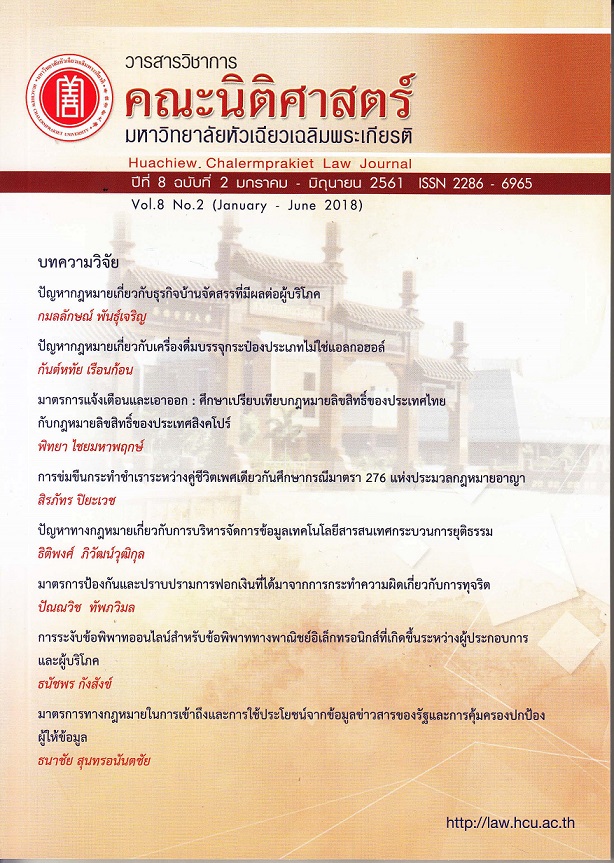Legal Problems of Non Alcoholic Canned Beverage
Keywords:
Consumer Protection Act, Canned Beverage, Fruity and Veggie BeverageAbstract
This thesis aims to study the laws relating to the non-alcoholic canned beverages, which do not have enough measures to protect consumers, especially compared to the international laws, such as the problems of food label, advertisement, state agency, and legal problems including civil, criminal, and administrative punishment, in order to solve the legal problems to make consumer feel relieved and saved. After a detailed study, the researcher suggests a means to solve the current problems, namely: labeling allergic substances of the products containing juices; providing laws that regulate and supervise the advertisement of beverage that has high sugar, fat, and sodium contents to protect children; issuing rules, criteria, or promulgation specifically for non-alcoholic canned beverages containing juices; establishing an agency responsible for regulating and monitoring the sales, labels, advertisement, and the manufacturing process; utilizing an accountability principle seriously in Thailand to make it fair for the consumers and proof without expenses for the products, process of which make the damage, by just proving the carelessness enough to determine the defect of the products; imposing more severe and stricter punishments, by adjusting the French model and apply it to the model in Thailand to be clear and decisive. Furthermore, applying a yearly random check by government agencies on sample of goods in Thailand, which can make consumers feel saved and confident in choosing the products, including fairness to both entrepreneurs and consumers.
References
กองเผยแพร่และควบคุมการโฆษณา, อย่าหลงเชื่อน้ำลูกยอ โฆษณาอ้างรักษาโรค (25 กรกฎาคม 2559) Asoke <https://www.asoke.info/09Communication/DharmaPublicize/Sanasoke/SA249/sa249_36.html>
นงนุช ใจชื่น, “วิวัฒนาการของกฎหมายและมาตรการที่เกี่ยวข้องกับการโฆษณาอาหารและเครื่องดื่มที่มีน้ำตาล ไขมัน และโซเดียมสูงของประเทศไทยและต่างประเทศ” (2558) 9:1 วารสารวิจัยระบบสาธารณสุข
นงนุช ใจชื่น, ปลุกเสือ : คุมโฆษณาอาหารและเครื่องดื่ม 3 กำลังสูง (นนทบุรี: บริษัท เดอะ กราฟิโกซิสเต็มส์ จํากัด, พิมพ์ครั้งที่ 2, 2557)
นฤมล คงทน, ขั้นตอนการนำเข้าสินค้าอาหารของประเทศญี่ปุ่น (Japan Food Import System) (25 กรกฎาคม 2559) fic.nfi.or.th < http://fic.nfi.or.th/japan-desk/upload/file/pdf/ขั้นตอนการนำเข้าสินค้าอาหารของประเทศญี่ปุ่น.pdf>
สำนักงานเลขาธิการสภาผู้แทนราษฎร, แนวทางการดำเนินงานคณะกรรมการคุ้มครองผู้บริโภคสภาผู้แทนราษฎร (25 กรกฎาคม 2559) Parliament <http://www.parliament.go.th/ewtcommittee/ewt/consumerism/download/article/article_20111007095133.pdf>
สํานักงานเลขาธิการสภาผู้แทนราษฎร, รายงานของคณะกรรมาธิการขับเคลื่อนการปฏิรูปประเทศด้านสาธารณสุขและสิ่งแวดล้อม สภาขับเคลื่อนการปฏิรูปประเทศ “การป้องกันและควบคุมปัจจัยเสี่ยงต่อสุขภาพด้านอาหารและโภชนาการในประเด็นการจัดเก็บภาษีเครื่องดื่มที่มีปริมาณน้ำตาลเกินเกณฑ์มาตรฐานสุขภาพ” (25 กรกฎาคม 2559) สภาการขับเคลื่อนการปฏิรูปประเทศ (สปท.) 2558 <http://library2.parliament.go.th/giventake/content_nrsa2558/d042659-02.pdf>
สำนักงานคณะกรรมการกิจการกระจายเสียง กิจการโทรทัศน์ และกิจการโทรคมนาคมแห่งชาติ,รายงานการสรุปอบรม โครงการฝึกอบรมเชิงปฏิบัติการเพื่อการพัฒนานโยบายและแนวปฏิบัติในการคุ้มครองผู้บริโภคในกิจการโทรคมนาคม และการศึกษาดูงานในหน่วยงานกำกับดูแลต่างประเทศ (25 กรกฎาคม 2559) tcp.nbtc.go.th < http://tcp.nbtc.go.th/uploads/vdo/pdfPublication/FranceReport.pdf>
Direction générale de la concurrence, de la consommation et de la répression des frauds, Avis de rappel d’une boisson “Moose Juice” de la marque Muscle Moose (6 สิงหาคม 2560) DGCCRF <https://www.economie.gouv.fr/dgccrf/avis-rappel-dune-boisson-moose-juicemarque-muscle-moose>
Downloads
Published
How to Cite
Issue
Section
License
บทความหรือข้อความคิดเห็นใด ๆ ที่ปรากฏในวารสารฉบับนี้เป็นวรรณกรรมของผู้เขียนโดยเฉพาะ คณะนิติศาสตร์มหาวิทยาลัยหัวเฉียวเฉลิมพระเกียรติ และกองบรรณาธิการไม่มีส่วนรับผิดชอบหรือไม่จำเป็นต้องเห็นด้วยกับข้อคิดเห็นนั้น แต่ประการใด








